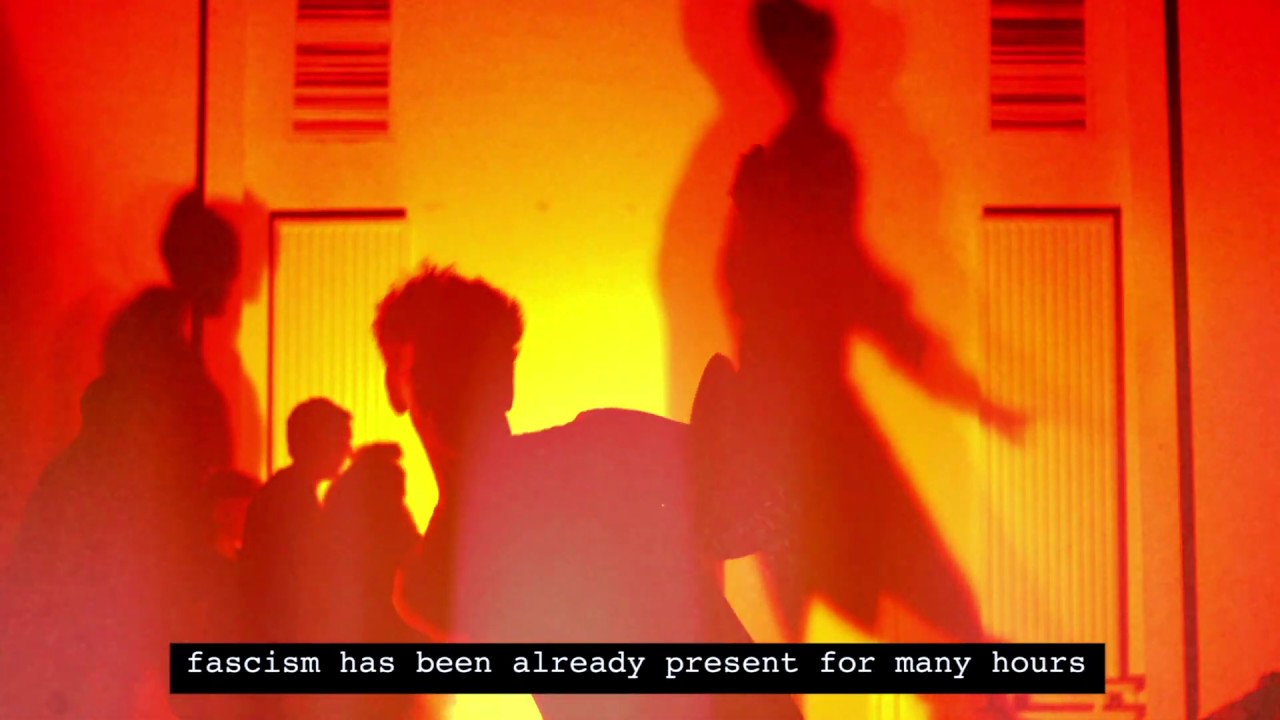Photos by Chris Almeida
Alabaster DePlume blends in well among the pleasant clutter of the Total Refreshment Centre in Dalston, the beloved creative hub and studio space from which he’s worked for the last five years. The wholesome, beaming faces of all the building’s current occupants, photographed individually, are plastered across one of the walls of its central communal space, some of which shuffle in and out of the kitchen in person, trading offers of coffee and tea, while on a precarious high shelf are placed a procession of dusty cassette players and radios. From sprawling corridors comes distant, muffled music which plays softly in the background as DePlume and I take a seat at the corner of a dining table that’s marooned in the middle of the room.
Almost immediately, he disarms the interview process. “It took you all your life to bring your whole self,” he says as I switch on my dictaphone. “Thank you for the work you do as a journalist. I would probably be crushed by the responsibility.” It’s the kind of statement that catches an interviewer off guard, and he smiles at that fact, but nevertheless it’s obvious from his voice and his expression how much he means what he says. There is something about the intensity of his focus, combined with the often-abstract, and philosophical way he can respond to a question that does away with formalities. His speech, delivered in a thick Mancunian accent, at times shifts suddenly dramatically in tone and at others slips sleekly into circular patterns, mantras and repetition.
“Before a show, I’ll tell the players ‘The best thing you’ve brought is yourself, and the more of you we can have in the piece the better,’” DePlume says, explaining that he changes the line-up of his band before every show to keep him on his toes. “It’s so we don’t have the time to be prepared. When you remove preparation people can’t hide, they have to be authentic and present. Your players need to be encouraged on stage, you get to encourage them, and the audience get to see what that makes happen. They get to see that ‘ah, this is a space for encouragement’. If you were to just say to the audience ‘this is a space for encouragement’, it doesn’t work. But if you can have something you can do in front of them, it demonstrates that.”
In an instant, he decides that it’s time for a tour of the Total Refreshment Centre’s maze of hallways and rooms. He’s been based here for five years, ever since he moved from Manchester. The people here, he says as we walk, were the first to offer him a cup of tea when he came to look around. Initially working a day job in Eltham as a teaching assistant, he would cycle an hour to work from his flat in Peckham. Then, after a full day’s shift, he would cycle for another two hours to the Total Refreshment Centre where he’d stay until midnight, before cycling all the way home once again. “I cycled for four hours a day just to pay some rent and keep being here,” he remembers. “It was ridiculous, I was so bored of cycling and I nearly died doing it so many times,” he says. “I was doing that for a few months, but I just would not go straight home and sleep because this," he gestures to the space around him, "is my work. Then I spent a couple of years not living anywhere just so that I could still have this studio. I think it’s just decided at some point that there’s no hope for anything else.”

We stop at first in therecording studio where his last album of new material, 2018’s The Corner Of A Sphere was made, a space where microphone stands zig zag each other like cranes on a construction site, and perilous tangles of cables sprawl across the floor. We pass a half-opened door from behind which snippets of a shimmering song-in-progress by one of Snapped Ankles can be heard, before eventually we settle on the room DePlume shares with the rapper Dizraeli. I take a seat on one of the room’s two chairs, but he sits on the floor. A little uncomfortable looming over him, I join him cross-legged on the ground.
DePlume’s habits and eccentricities might be a little irritating did he not feel like such a genuine and honest person. He makes such an effort to engage you with every ounce of his being that it’s hard to imagine there’s even any room left for affectations. “For some reason I just always like sitting on the floor when I’m chatting with someone properly,” he says earnestly. “When someone’s interviewing you, you immediately get these things in your head that are like ‘you’d better say this or that, make sure [the interviewer] doesn’t think you’re something you don’t want to be. Oh just give up!’ So I like to sit on the floor.”
The same warmth that DePlume exudes when you sit in conversation with him is captured on his new album, To Cy & Lee: Instrumentals Vol. 1. For the most part, the record consists of music lifted from across his last four studio albums, with two new compositions called ‘What’s Missing’ and ‘If You’re Sure You Want To’, recorded by DePlume and a one-off band consisting of Sarathy Korwar, Donna Thompson, James Howard, The Comet Is Coming’s Dan ‘Danalogue’ Leavers and Snapped Ankles’ Chestnutt. The music is gorgeous and soothing, intimate and direct. Between sweet and affecting melodies you can hear the sounds of fingers clicking on keys, buried voices counting time in the distance. Taking away the mercurial, frenetic vocals that appear on his other albums makes the music’s more directly emotional and calming qualities “easier to digest,” as he puts it, which is the point of the release. “People have said this to me: ‘I put your music on, and it was perfect, but then you started shouting something about a pig. Can’t it just be the nice bits?’ Sometimes I think, well, that’s fair enough! One of the things I wanted to do with this album is to make more people welcome.”
Appealing to more than just his established audience is vital, DePlume says. "I like to ask myself, who am I making this shit for? I believe that whatever we do, whatever we make, however we make it, some people are gonna see it and say ‘yep, that’s for me’. And where we fail to decide who our shit is for, that decision is gonna be made for us, and it’s probably gonna be made on behalf of privilege and division. For example, I don’t want to play in theatres, because people going to the theatre are already going to the theatre; they don’t need my shit. I want the sort of person who doesn’t want to go and see poetry. The ones who are already going to poetry don’t need my shit. I want to do shows in nightclubs. I want to connect with people who are different for me, because otherwise, how do I know that I’m not contributing to everyone being so far away from each other?F"

The idea of an instrumental album was first pitched by Karl-Jonas Winqvist of Swedish indie label Sing A Song Fighter. Winqvist’s own imprint didn’t have the resources for the release, so DePlume took it out of curiosity to his friend Scottie McNiece at International Anthem. “He loved it, and I didn’t expect that. I felt like International Anthem would make a big thing of it and everyone would go ‘so what?’. I felt like a bit of a dickhead putting out tunes I’d already put out, and I was terrified of announcing the release," the musician says. "But people are responding to it because to them, it is brand new. Even though they could have got hold of a lot of it already, they didn’t know that. Also, I felt like people would appreciate just being able to listen to the instrumentals without me saying some weird fucking poem.”
That said, while DePlume’s ‘weird fucking poems’ might be jarring for some, their removal does mean that he loses the direct, immediate channel of communication they provide. Often, his wild and flamboyant words come backed by strong socio-political intent, a counterweight to his more whimsical inclinations. That loss is something that’s addressed in the video for ‘What’s Missing’, which features the final public speech of Chile’s president Salvador Allende, shortly before his Marxist government was overthrown by a US-backed coup d’etat and replaced by the brutal and oppressive General Augusto Pinochet. Allende’s words, bold, sorrowful, despairing and defiant, appear as subtitles but are neither spoken nor sung out loud – made all the more powerful both by their lasting power today and the sense of absence in their presentation. “Other men will overcome this dark and bitter moment, when treason seeks to prevail,” the speech concludes. “Go forward knowing that, sooner rather than later, the great avenues will open again, where free men will walk to build a better society.”
Does DePlume, then, think his politics still come across on his instrumentals? He hesitates a second. “I feel like it’s too easy for me to say that it does,” he decides. “I’m going to say that I’ve got a lot more work to do on my politics, and about our way forwards in this work and this society. My work is not done by playing nice instrumentals, but it’s not harmed by that either. And I will do my work on these nice tunes, but I will be honest about my politics, and I have a lot more to do.”
The titular Cy and Lee are two men with learning difficulties who DePlume befriended before he moved to London, during his time working for the Manchester-based charity Ordinary Lifestyles, and with whom he composed music as part of their work together. “We had a team leader called Maureen, who was my sensei, basically, and she taught me through the way she managed me about encouraging people to do the things that they feel like doing, and through doing that making the progress that you want. She saw that I liked to make music, so she got making music to be a part of our work. We would make these massive sessions with 30 people with learning difficulties all making music.
“There are things that you and I fail to communicate with words that we can only express through enjoying music and taking part in music. The same is more true for those who have fewer words to use, and when they can express themselves in music it’s unbelievable, epic, beautiful times. You can bring musical expression to people who are denied so much communication in this society and in their general existence. It’s magic.”
The two new compositions on Instrumentals Vol. 1 are based on melodies that DePlume came up with while working with Cy and Lee, music that he found had a calming effect when “they were having a hard time, or I was having a hard time. There’s times when you’re sharing an experience of life, and it’s what is required for calm, or just generally being alright. I saved the melodies and they turned into these tunes. They’re a continuation of that vibe, to me anyway, and they represent that feeling. What was needed then, it’s the same method and the same energy.” The new songs continue to fulfil that role when slotted in amongst the older compositions that make up the new album – they are pieces of calm and comfort. De Plume wanted to release such album “because we’re suffering and we’re terrified, and these things are useful sometimes when we’re suffering and terrified.”



